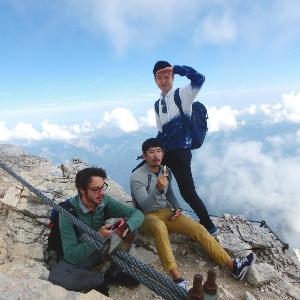Summer Schools: On Zoom instead of on the Zugspitze
13 Aug 2021
LMU’s Munich International Summer University (MISU) is taking place virtually this year. Some of the benefits of the digital format may even be preserved in the future.
13 Aug 2021
LMU’s Munich International Summer University (MISU) is taking place virtually this year. Some of the benefits of the digital format may even be preserved in the future.

Summer Schools are taking place virtually this year. That means no trips to the Bavarian mountains...
When Deborah Davis attended a winter university, temperatures were a pleasant 23 degrees Celsius—at least in Australia, where she was. “I always wanted to learn more about Europe,” says the 20-year-old University of Sydney student. “And actually, it’s long been my goal to travel to Munich to take part in a summer or winter university.” But the coronavirus put paid to those plans. So the Media and Communication student did the “next best thing,” as she puts it: she enrolled in a virtual winter university on European Studies at LMU Munich—and learned about European history and relations between EU countries via Moodle and Zoom.
After some parts of LMU’s Munich International Summer University (MISU) had to be cancelled last year due to the pandemic, the majority of MISU courses will be offered online in 2021—with the summer program, which started in July, running until early September. For students like Deborah Davis, the new, virtual format means the convenience of learning from home, no traveling half-way around the globe and no looking for accommodation in expensive Munich—even though a certain quota of rooms in student union dorms are now held open for exchange students. But on the other hand, it also means no beer garden visits with students from up to 80 different nations, no trips to the Bavarian mountains, no visits to soccer matches in the company Making the best out of a difficult situationof other students.
“We made the best out of a difficult situation,” says MISU coordinator Kai Wede. “But of course, even the best virtual courses miss out on the basic idea behind a summer university, which is to combine a vacation with the opportunity for learning.” In the tradition of the summer schools dating back to 1926, the current concept of the MISU at LMU has been in place since the 1990s: Students from all over the world travel to Munich during their vacations to take German language courses or follow programs in disciplines such as Economics and Communication, Law, Natural Science, and Social and Political Sciences. Funded by the University of Munich’s International Club (IUCM), the classes are held in English by professors from LMU and—in contrast to some summer courses at other universities—are not for profit. In principle, they are open to all students, even if LMU does explicitly address its partner universities with some of the programs.
Having seen more than 1,000 participants at the MISU in 2019, enrollment in the virtual courses dropped to 40 percent this year. “We were surprised that it was still so well received despite this completely new format,” says Kai Wede. Some courses had to be cancelled altogether. “Middle East Studies, for example, is one that benefits particularly from the local presence,” says the MISU coordinator, “given the discussions that normally take place between participants from very different cultural backgrounds.” In the field of medicine, too, the summer university will not be back until 2022. “The classes in neurology and oncology involve hands-on training with patients,” explains Kai Wede, “which is simply not possible to do virtually.”
Other programs are being held digitally this year: The Munich Center for Quantum Science and Technology (MCQST), for example, is giving virtual tours of its labs, offering mentoring from junior researchers and even organizing a mini-conference. Lectures in law, business studies and more are taking place online and interactively, as well. And the European Studies program had to be held without students traveling to Europe this time. Australian Deborah Davis was particularly enthusiastic about the classes on European history—precisely because the focus in Australia is more on Chinese and U.S. politics. “I’d never heard of the Schengen Agreement, for instance,” explains Davis. “It was just great to slip out of our Australian mindset for once and find out what’s important on the other side of the world.”
To ensure a certain degree of individual attention, explains Kai Wede, participant numbers were limited to 15 to 18 students per class. Timings were tailored to time zones, with morning programs for Canadians, Americans and Latin Americans, and evening courses for Australians and Europeans, for example. The social program, which usually sees participants visiting Neuschwanstein Castle or going to beer gardens, was replaced with virtual city tours to places like Marienplatz, the English Garden and around the main university building at LMU Munich.
It was cool to meet people from places like Denmark and Australia—even if only on the screen.Silje Abrahamsen, student from Norway

...or insights into life on a Bavarian farm.
Silje Abrahamsen, a Norwegian who took the MISU winter university course on “The European Union in Crisis,” would also have preferred to learn on the ground in Munich. “I love to travel and visit new places,” says the 23-year-old, “and spending an educational vacation in Munich would have been perfect.” The online setting made everything different, of course. “Online, you can only ever talk to the other participants for a short space of time. But it was cool to meet people from places like Denmark and Australia—even if only on the screen.”
“Interestingly, what we noticed,” says Kai Wede, “was that different personalities present themselves quite differently in virtual classes.” For example, he says, more dominant people suddenly become less of a presence, while the quieter ones really blossom. Students from Asia benefited from this in particular. Participants whose command of English is less than perfect also benefit from learning through self-study and Moodle modules. And even though Kai Wede would like to see the return of a face-to-face MISU in the near future, some of the advantages of the digital format will be retained in the future. “We will split certain programs into online and face-to-face components—the first part involving self-learning and virtual lectures at home, the second part here in Munich.” That’s because it’s difficult for some participants to stay in the Bavarian capital for any great length of time anyway—partly because of the high cost of living, but also because some may not have enough annual leave.
Deborah Davis found the virtual setting “very convenient— surprisingly enough.” She has even become friends with a fellow student from the University of Sydney whom she met on one of the Munich courses. “I do think it must have been very, very early for the professors on the other side of the world, though—and the lovely guide on the virtual city tour looked like she was freezing cold at Marienplatz.”
More information on Munich International Summer University (MISU): www.lmu-misu.de
Other European universities are also holding their summer schools primarily online during the pandemic. This also applies to the summer programs of university associations such as the European University Alliance for Global Health (EUGLOH).